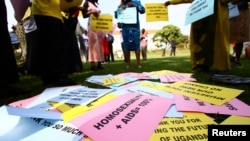The World Health Organization says discrimination, stigmatization and laws that criminalize homosexual and transgender behavior are hampering these people from getting the health services they need. The WHO is also warning HIV/AIDS will spread if gays and other people at high-risk fail to get access to HIV prevention and treatment.
Anti-retroviral therapy is successfully keeping millions of people with HIV alive. Yet millions of people who are most at risk of infection are not receiving these life-saving drugs or other essential care.
The World Health Organization says men who have sex with men, people in prison, people who inject drugs, sex workers and transgender people are facing discriminatory laws and policies in many countries, which are preventing them from gaining access to HIV prevention, testing and treatment services.
WHO says stigmatization and laws criminalizing so-called deviant behavior discourages high-risk people from seeking help and are driving the disease underground.
WHO HIV Department Director Gottfried Hirnschall said these policies are counter-productive and threaten to spread the epidemic in the broader community.
"Obviously, these people-men who have sex with men, injected drug users-they do not live in isolation and we see overlap of these behaviors. Somebody who uses drugs can be an MSM (man who has sex with men) [who] can sell sex. Somebody, who is a sex worker will have partners, may have children, etc. So, obviously there are these linkages that are very important," said Hirnschall.
By the end of 2013, WHO reports around 13 million people were receiving antiretroviral therapy. Most of these people are living in poor-and-middle-income countries. This has led to a 20 percent drop in HIV-related deaths. While this is good news, the WHO says preventive efforts are still lagging behind, particularly among the high-risk groups.
UNAIDS Rights, Gender, Prevention and Community Mobilization Director Mariangela Simao said many people do not seek treatment for HIV because they fear their right to confidentiality will be breeched.
“This has been threatened lately, at least in two countries - in Nigeria and in Uganda, related to the obligation of anybody to report if they know of someone who is a gay man or a lesbian. We have reports from these countries that have documented serious disruptions in the availability and access to HIV and other health services, following the promulgation of these laws," said Simao.
The World Health Organization is launching new guidelines on HIV prevention, diagnosis, treatment and care focusing on these five key high-risk groups in advance of next week's AIDS Conference in Melbourne, Australia.
The guidelines include a range of clinical recommendations and stress the need for countries to remove the legal and social barriers that are preventing many people from accessing life-saving services.







